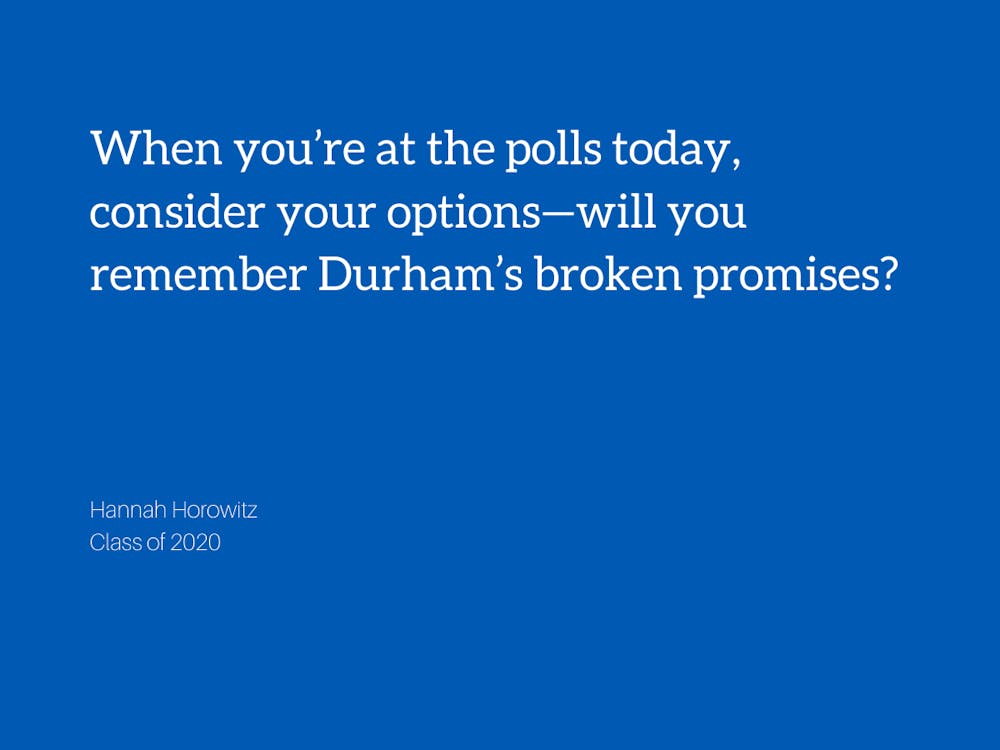Durham City Council candidate Joshua Gunn is not opposed to the Affordable Housing Bond—but he has some concerns. And you should too.
Gunn is a fourth generation Durhamite whose ancestors came to Durham following emancipation, in search of the economic opportunity the city claimed to afford to all people. Today, Gunn’s career as a rapper or his role on the BET reality series Music Moguls may not make him an obvious choice for Durham’s City Council, but his commitment to bettering the city is clear. Not only is he vice president of the Greater Durham Chamber of Commerce, but he is also on the boards of the Durham Public Schools Foundation, the North Carolina Center for Nonprofits, and the Museum of Durham History. His role in the community earned him support from the Durham Committee on the Affairs of Black People, the Friends of Durham, the local chapter of the Fraternal Order of Police, former city council member Cora Cole-McFadden, and current council member Mark-Anthony Middleton.
In this week’s election, Gunn will challenge three incumbents, but he is starting by challenging their ardent support for the affordable housing bond.
The $95 million affordable housing bond will appear on the ballot in Durham’s election on November 5. Durham Mayor Steve Schewel called for the increase in funding in his State of the City address last February. Currently, the Durham Housing Authority (DHA) does not have the funding to create affordable housing for low-income people in downtown, who are primarily people of color, Schewel said.
The city of Durham’s website claims that the $95 million bond would construct 1,600 new affordable housing units; provide housing for 1,700 households experiencing homelessness; create affordable home ownership opportunities for 400 first-time homebuyers; allow 3,000 low-income renters and homeowners to remain in or improve their homes; and bring thousands of new jobs to the city. The promises advertised are hard to oppose.
Gunn agrees that “the crisis of low-income housing is real,” but the city of Durham has a history of “failed promises to its most vulnerable population; black and brown folks.” Gunn’s family was one of the many that has felt the devastation of similar bonds in the past.
In 1960, a wave of urban renewal projects swept the nation—and Durham was no exception. The city’s ballot that year featured a bond that promised many benefits to low-income communities of color, similar to those listed today. Residents of Durham’s historic African-American community Hayti were promised that they would return to “a better place to live and work,” once the redevelopment project finished. Additionally, residents were promised “financial help by the Redevelopment Commission as well as assistance in finding a suitable, standard relocation facility.”
Unfortunately, most of the residents who once occupied Black Wall Street did not return. Those who did found Pettigrew and Fayetteville Streets lined with dilapidated structures where their once thriving businesses once stood. The general leadership, local management, unforeseen side effects, and racial bias were blamed—but no one was e held accountable.
Durham did not learn from its mistake. In 2000, DHA announced a new solution to Few Gardens, a public housing site that Gunn remembers as being “one of the most dangerous neighborhoods in Durham." "Even just sitting on the school bus I was scared,” Gunn recalls.
DHA claimed that with a HOPE VI grant of $35,000,000 and “an additional $120,000,000 from public and private sources,” the city could “revitalize” Few Gardens and “strengthen” the surrounding community. “The new housing will be well designed and will include a range of rental housing and homeownership opportunities,” the city stated.
Again, the low-income, primarily black residents were promised a right of return. After demolition began in 2003, “most people in Few Gardens never returned and there was no record of where they went,” says Gunn, who had family in the former public housing site. “Again, the city said ‘we tried, but housing costs were more than expected. It was out of our control,’” Gunn continues.
Today, the bond proposed will again “disproportionately impact black and brown folks in the community,” yet so far, their concerns have not been met with concrete changes to the bond in writing. Just like the leadership that passed the Urban Renewal Project of 1960 and the Hope VI grant for Few Gardens, Gunn believes that Durham’s leadership “lacks authentic relationships with the community members” that will be impacted most. If elected, he would be one of two city council members born and raised in Durham; the other is Vernetta Alston.
Though Gunn is advocating to pass the bond, we need to ensure accountability measures. One way to do so is by electing leaders next week who will fight for these measures in writing after the bond is passed. Accountability means an oversight committee including members from the communities that will be impacted most; keeping track of the people who will be relocated during construction; and realistic, precise numbers that residents can hold leaders accountable to.
So when you’re at the polls today, consider your options—will you remember Durham’s broken promises?
Hannah Horowitz is a Trinity senior.
Get The Chronicle straight to your inbox
Signup for our weekly newsletter. Cancel at any time.

